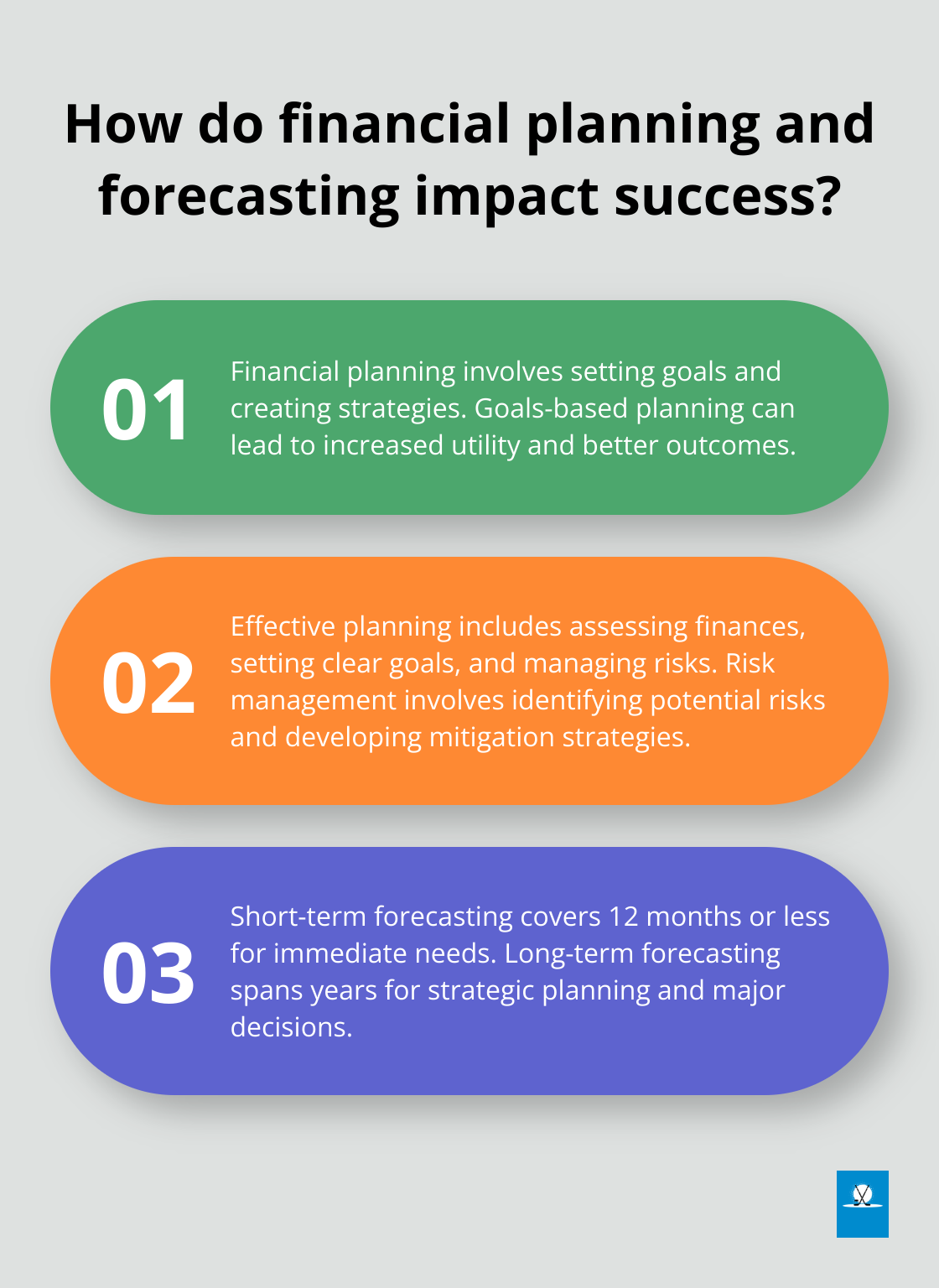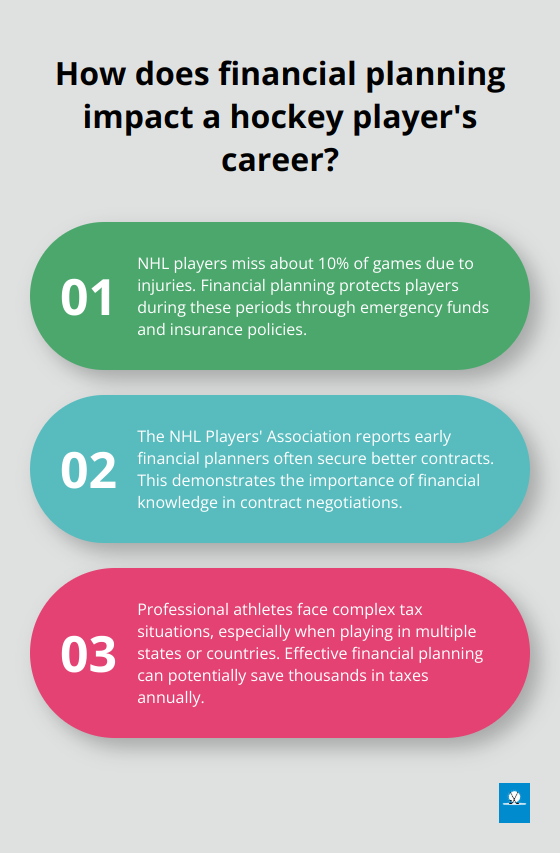Financial planning and forecasting are essential tools for success in today’s dynamic business landscape. At Pro Hockey Advisors, we’ve seen firsthand how these practices can transform organizations and individual careers.
The importance of financial planning and forecasting cannot be overstated, as they provide a roadmap for achieving goals and navigating uncertainties. In this post, we’ll explore why these strategies are critical and how you can implement them effectively.
What Are Financial Planning and Forecasting?
Defining Financial Planning and Forecasting
Financial planning and forecasting are essential tools for businesses and individuals to make informed decisions about their financial future. Financial planning involves setting financial goals and creating a roadmap to achieve them. It requires an analysis of the current financial situation, identification of future needs, and development of strategies to meet those needs. Forecasting predicts future financial outcomes based on historical data and market trends.

A study by the Financial Planning Association suggests that using a goals-based framework for financial planning can lead to increased utility and better outcomes. This highlights the significance of these practices in achieving financial success.
Key Components of Effective Financial Planning
Effective financial planning consists of several key components:
- Assessment of current financial situation (income, expenses, assets, and liabilities)
- Setting clear, measurable financial goals
- Risk management
Risk management involves the identification of potential financial risks and the development of strategies to mitigate them. For professional athletes, this might include insurance policies to protect against career-ending injuries or investment diversification to guard against market volatility.
Short-Term vs. Long-Term Financial Forecasting
Short-term financial forecasting typically covers a period of 12 months or less. It focuses on immediate financial needs and helps with day-to-day decision making. For a hockey player, this might involve budgeting for training expenses or planning for upcoming contract negotiations.
Long-term forecasting spans several years and is used for strategic planning and major financial decisions. This could include planning for post-career transitions or long-term investment strategies. A study by McKinsey & Company found that AI-driven forecasting can reduce costs by about 10 to 15 percent while improving service levels by 5 to 10 percent.
The Role of Technology in Financial Planning and Forecasting
Modern financial planning and forecasting heavily rely on technology. Advanced software and tools enable more accurate predictions and streamlined processes. These technologies allow for:
- Real-time data analysis
- Scenario modeling
- Automated reporting
The integration of artificial intelligence and machine learning in financial planning tools has revolutionized the industry, providing more precise forecasts and personalized financial strategies.
The Impact of External Factors
External factors play a significant role in financial planning and forecasting. Economic conditions, market trends, and regulatory changes can all impact financial outcomes. Successful financial planning takes these factors into account, allowing for flexibility and adaptability in the face of changing circumstances.
As we move forward, it’s important to understand how these concepts translate into tangible benefits for businesses and individuals. The next section will explore the numerous advantages that effective financial planning and forecasting can bring to your financial journey.
How Financial Planning Boosts Your Hockey Career
Smarter Contract Negotiations
Data-driven analysis is crucial during contract negotiations and salary cap management. You’ll enter negotiations knowing exactly what you need to earn to meet your long-term goals. This knowledge provides leverage. The National Hockey League Players’ Association reports that players who start financial planning early in their careers often secure more favorable contracts.
Injury-Proofing Your Finances
Hockey comes with high risks. Financial forecasting prepares you for unexpected setbacks while you focus on peak performance. Emergency funds and insurance policies protect you against career-threatening injuries. NHL statistics show that players miss about 10% of games due to injuries. A solid financial plan ensures you stay covered during these periods.
Maximizing Earning Potential
Financial planning extends beyond saving; it focuses on wealth growth. Forecasting your earnings and expenses helps identify investment opportunities to multiply your income. Financial advisors can play a crucial role in addressing the problem of professional athletes going broke and potentially improving their financial outcomes.
Tax Optimization Strategies
Effective financial planning includes tax optimization. Professional athletes face complex tax situations (especially those who play in multiple states or countries). A well-crafted financial plan helps you navigate these complexities, potentially saving thousands in taxes each year.
Post-Career Transition Planning
Financial planning looks beyond your active playing years. It prepares you for life after hockey. This includes investment strategies, business ventures, and education plans. The NHL Alumni Association emphasizes the importance of early post-career planning for long-term financial stability.

Financial planning and forecasting serve as essential skills for any professional hockey player. They provide the foundation for a successful career on the ice and a secure future off it. Next, we’ll explore how to implement these strategies effectively in your hockey career, ensuring you make the most of your earnings throughout your professional journey.
How to Implement Effective Financial Planning Strategies
Choose Advanced Financial Tools
The first step in implementing effective financial strategies is to select the right tools. Modern financial planning software offers powerful features that can enhance your financial management. Platforms like Quicken and Personal Capital provide real-time tracking of investments, expenses, and income. These tools help you visualize your financial situation and make informed decisions.

However, these tools should complement, not replace, professional financial advice. A study by the CFA Institute defines three themes affecting investor trust today: a divided trust landscape, technology as a trust multiplier, and the additive factors of trust.
Create Accurate Financial Projections
Developing accurate financial models and projections is a critical component of effective financial planning. This process involves analyzing your current financial situation, including your contract details, endorsement deals, and investment portfolio.
For professional hockey players, it’s essential to factor in the unique aspects of your career (such as potential trades, injuries, or early retirement). We recommend using Monte Carlo simulations, a statistical technique that accounts for various scenarios and probabilities. This method can provide a more realistic view of your financial future and help you prepare for different outcomes.
Incorporate Data Analytics and Market Trends
In today’s data-driven world, incorporating analytics and market trends into your financial planning is essential. This involves staying informed about league-wide salary trends, market valuations for players in your position, and broader economic indicators that could affect your investments.
For example, the NHL salary cap has increased over the past decade. Understanding these trends can help you negotiate better contracts and make more informed investment decisions.
Review and Adjust Regularly
Financial planning is not a one-time event but an ongoing process. Regular review and adjustment of your financial plans are essential to ensure they remain aligned with your goals and current circumstances.
We recommend conducting a comprehensive review of your financial plan at least annually, or more frequently if significant life events occur (such as signing a new contract or starting a family). This review should include an assessment of your investment performance, a re-evaluation of your risk tolerance, and adjustments to your savings and spending strategies.
Seek Professional Guidance
While self-education is valuable, professional guidance can significantly enhance your financial planning efforts. Financial advisors specializing in sports finance can provide tailored advice that considers the unique aspects of a hockey career. Pro Hockey Advisors offers expert consulting services for professional hockey players, focusing on career management, contract negotiations, and financial planning. Their industry expertise and personalized strategies can help optimize your career and secure better contracts.
Final Thoughts
Financial planning and forecasting are indispensable tools for success in professional hockey and beyond. These practices provide a clear roadmap for achieving financial goals, managing risks, and navigating uncertainties in a dynamic career. Athletes who implement effective financial planning strategies make informed decisions about their contracts, investments, and long-term financial security.

The importance of financial planning and forecasting empowers individuals to take control of their financial future. It optimizes earning potential and prepares for life after a playing career. Financial planning touches every aspect of a professional athlete’s life, from smarter contract negotiations to injury-proofing finances and planning for post-career transitions.
We at Pro Hockey Advisors understand the unique financial challenges faced by professional hockey players. Our expert consulting services help you navigate the complexities of career management, contract negotiations, and financial planning in the competitive world of professional hockey (including ongoing support throughout your career). Take the first step today towards securing your financial future and maximizing your potential in professional hockey.


